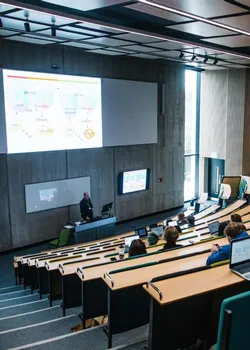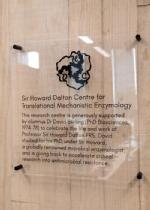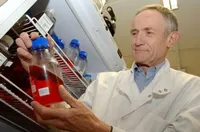Life Sciences News
See our Latest Journal Publications
Giant phage holds promise as treatment for lung infections, Warwick researchers find
Dr Jessica Lewis, from the Sagona Lab, has discovered a new bacterial killer that can target common lung infection caused by Burkholderia bacteria that has exciting potential for biotechnological applications.
Press release (3 April 2024)
£1.5m donation drives UK-Japan collaboration in antimicrobial research
A £1.5 million donation will drive joint research into antimicrobial resistance (AMR) by scientists in the UK and Japan.
Antimicrobial resistance poses a huge problem in healthcare, risking modern medicine becoming ineffective. This could lead to common infections becoming deadly illnesses. Now, thanks to visionary philanthropy from The Great Britain Sasakawa Foundation, which encourages innovative research between Japan and the UK, and The Sir Howard Dalton Centre at The University of Warwick, the research can progress at pace.
Press Release (6 March 2024)
My placement year in antimicrobial research
Emilie Cummerson, a Biomedical Science with Placement Year student, has just completed a year-long placement in the Sagona Lab and the university’s spinout company Cytecom. She describes her experience in an article for the Microbiologist.
Read the article.
Microbiologist of the Year
Chelsea Brown, a PhD student with Professor Phill Stansfeld and Dr Liz Fullam, won the Sir Howard Dalton Young Microbiologist of the Year for her talk entitled 'Modelling Mycobacterial Membranes: Anyone for PIMS?' at the 2023 Annual Microbiology conference. Chelsea presented her research to a panel of judges at the Microbiology Society Showcase on Tuesday 3 October 2023.
Historical medicine suggests a new way to use modern treatments
Combining honey and vinegar could be an old, yet new, way of treating persistent infections. The mixture of honey and vinegar, also known as oxymel, has been used as a medical treatment throughout history and now scientists have established that this combination could have modern applications in the treatment of wounds. New research by Dr Erin Connelly, Dr Freya Harrison and team, published in Microbiology, is the first comprehensive exploration of how the mixture could be applied to modern medicine and improve treatments for infections.
Press release (13 July 2023)
ENABLE workshop: Are the university learning environments as inclusive as we think?
 On Friday 29 September 2023, the School of Life Sciences will be hosting a free workshop: "Are the university learning environments as inclusive as we think? An investigation from the awarding perspective".
On Friday 29 September 2023, the School of Life Sciences will be hosting a free workshop: "Are the university learning environments as inclusive as we think? An investigation from the awarding perspective".
Based on a thorough data analysis from recent years and first-hand practical experience, the workshop will identify existing reasons for lack of inclusivity and unbiased awarding in biological science and related degree streams.
The workshop participants, comprising academic leaders, teaching professionals and a diverse student community, will also provide on consensus recommendations on how to close existing awarding gaps for a more inclusive learning and teaching environment throughout the UK.
Consensus recommendations will be published in a peer-reviewed journal.
New discovery stops bacterial virus contamination
A new discovery by Dr Antonia Sagona and colleagues could help stop bacteria being contaminated with viruses, reducing disruption and decreasing costs in industry and research.
Press Release (18 April 2023)
A “zinc” in the armour: could metal help combat common superbug?
A new study has shown that zinc plays a key role in a hospital superbug, that doctors struggle to treat due to its resistance to antibiotics.
Press Release (15 February 2023)
Bacteria communicate like us – and we could use this to help address antibiotic resistance
Like the neurons firing in human brains, bacteria use electricity to communicate and respond to environmental cues. Now, researchers have discovered a way to control this electrical signalling in bacteria, to better understand resistance to antibiotics.
In the study published in Advanced Science, Dr Munehiro and colleagues, report a major step forward in regulating bacterial electric signals with light.
Press Release (13 February 2023)
New study into Tuberculosis membrane molecules will aid drug delivery
 Chelsea Brown, a PhD student with Professor Phill Stansfeld and Dr Liz Fullam, has published a first author paper on tackling Tuberculosis (TB) by modelling mycobacterial membranes.
Chelsea Brown, a PhD student with Professor Phill Stansfeld and Dr Liz Fullam, has published a first author paper on tackling Tuberculosis (TB) by modelling mycobacterial membranes.
TB rivals covid-19 as the biggest infectious disease killer of humans, claiming millions of lives each year. Now, ground-breaking research from the Universities of Warwick and Toulouse has identified a new method to help tackle this global issue.
Press Release (30 January 2023)
Four new academic positions available in the School of Life Sciences
We wish to appoint four excellent and ambitious early to mid-career principal investigators who are capable of developing innovative and original research programmes:
- 2 x Permanent positions focused on Host-virus Interactions
- 1 x Permanent position focused on Plant Virology
- 1 x Permanent position focused on Host Responses to Microbes
£1.7m containment facility will help tackle globally important diseases and prepare for future pandemics
A £1.7m laboratory building which will investigate infectious diseases has opened at the University of Warwick – helping to tackle some of the most globally important human diseases and prepare for pandemics of the future. The new containment suite will enable scientists to conduct cutting-edge research into infectious diseases, including tuberculosis (TB), influenza and COVID-19.
Press release (8 December)
Weldon Prize for SPI-M-O and Zeeman modellers
Professor Matt Keeling and Dr Louise Dyson were part of the Warwick Zeeman team invited to attend the Weldon Prize giving in Oxford.
This prize is awarded annually for ‘noteworthy contributions to the development of mathematical or statistical methods applied to problems in Biology’. This year it was given to the SPI-M-O group (part of SAGE) in recognition for their work during the COVID-19 pandemic.
£1.7m memorial donation enables new antimicrobial research
 A £1.7 million memorial donation will help drive new research into antimicrobial resistance at the University of Warwick. The donation, made in recognition of the late Sir Howard Dalton, will fund research and scholarships to help discover new drugs that target resistant microbes.
A £1.7 million memorial donation will help drive new research into antimicrobial resistance at the University of Warwick. The donation, made in recognition of the late Sir Howard Dalton, will fund research and scholarships to help discover new drugs that target resistant microbes.
On Thursday 20 October, a launch event was held in the University of Warwick’s new Interdisciplinary Biomedical Research Building (IBRB) for the Sir Howard Dalton Centre for Translational Mechanistic Enzymology. Professor Chris Dowson, Co-Director of the new Centre said “A key focus for scientists at the Centre will be understanding changes to enzyme structures which underpin drug resistance in microbes. We want to discover how these modified enzymes are formed and what we can do to overcome the resistance".
Press Release (21 October 2022)
Our Technical Talent
 Over the next few weeks the University is showcasing the vital roles our technical staff play in the world-class research and teaching at Warwick. The latest video features Georgia Lavender, Senior Teaching Lab Technician, from the SLS Teaching Lab.
Over the next few weeks the University is showcasing the vital roles our technical staff play in the world-class research and teaching at Warwick. The latest video features Georgia Lavender, Senior Teaching Lab Technician, from the SLS Teaching Lab.
Watch the video.
Consider farmers at individual level when controlling livestock disease outbreaks, researchers say
 Livestock diseases will be better managed by incorporating the behaviours of individual farmers into national infection control policies, according to new research.
Livestock diseases will be better managed by incorporating the behaviours of individual farmers into national infection control policies, according to new research.
The findings are the latest from the BBSRC-funded Farmer-led Epidemic and Endemic Disease-management (FEED) project, an interdisciplinary research group including epidemiologists, mathematical modellers, behavioural scientists and veterinarians from the Universities of Warwick and Nottingham. The research is published this week, in the journal PLOS Computational Biology, in a paper entitled “Modelling livestock infectious disease control policy under differing social perspectives on vaccination behaviour”.
Press Release (15 July 2022)
Citizen Science: Know Your River
'Know Your River' is a new citizen science project based at the School of Life Sciences, funded by the Enhancing Research Culture Fund from UKRI.
The Know Your River Team, led by Dr Chiara Borsetto, is looking at the pollution state of rivers in England and their use for recreational purposes by using a citizen science approach. The project aims to raise awareness across the public on the issue of sewage pollution in rivers and associated risks to human health and also to engage with policy makers to help promote safeguarding of our rivers.
Anyone who is interested in rivers or using rivers for recreational activities across England can help by telling us how they use rivers and what their perception of river pollution is through anonymous surveys. You can also join in by collecting river water samples from across the River Severn, Thames and Humber catchment areas. The water samples will be analysed for presence of E.coli and other coliform bacteria resistant to antibiotics and the presence of selected antibiotics will also be monitored. We believe that citizen science can be a powerful tool to gather information about the environment we all live in. The deadline for participation is Thursday 30 June.
If you would like to find out more or be involved in the project, then please visit our website at www.warwick.ac.uk/knowyourriver and follow us on Twitter.
Bad bugs, no drugs: A world without antibiotics
 It was announced last month that two new antibiotics may be available on the NHS. Professor Chris Dowson explains why there is an urgent need to develop new antimicrobials and protect the drugs we have.
It was announced last month that two new antibiotics may be available on the NHS. Professor Chris Dowson explains why there is an urgent need to develop new antimicrobials and protect the drugs we have.
Knowledge Centre article (12 April 2022)
Study estimates death toll of antibiotic-resistant bacteria - Warwick experts comment
A new Lancet study shows that over a million people died in 2019 from infections caused by bacteria resistant to antibiotics. Dr Freya Harrison and Dr Antonia Sagona comment on the importance of this new evidence and the need to tackle the issue of antibiotic resistance urgently.
Expert Comment (20 January 2022)
Poolbeg Pharma licences first-in-class broad spectrum RNA-based immunotherapy for respiratory virus infections from the University of Warwick
 Poolbeg Pharma, a clinical stage infectious disease pharmaceutical company, has in-licenced a novel, first-in-class RNA-based immunotherapy for respiratory virus infections.
Poolbeg Pharma, a clinical stage infectious disease pharmaceutical company, has in-licenced a novel, first-in-class RNA-based immunotherapy for respiratory virus infections.
Poolbeg has secured an exclusive licence to this dual antiviral prophylactic and therapeutic candidate, which is at a late-pre-clinical development stage. The candidate, which will be developed by Poolbeg as POLB 002, was developed at the
Press release (17 January 2022)
